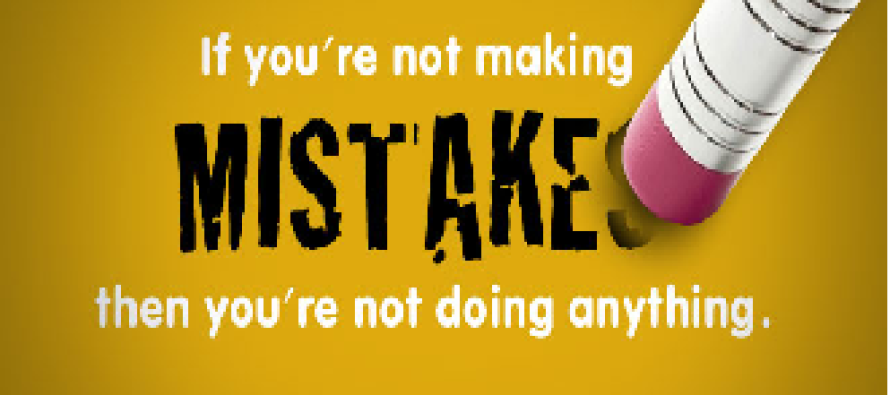Don’t Fear Mistakes

We all make mistakes. We are imperfect and vulnerable to making mistakes. Whatever our social standing is, we all make mistakes in our personal and professional lives. We learn, grow and develop from our mistakes. However, in order to accomplish such feats, we must get the courage to admit our mistakes. This is a difficult task.
Generally, our primary response to our mistakes is to deny it or to create an excuse. This is because, we, as human beings, have a tendency of not looking stupid or ill informed amongst others. Not only this, in many cultures, our social status is based upon our work. If we fail a test, then we are considered as a failure. Over time, such judgements have taken their tolls on the human mind; scaring us from admitting our own mistakes. However, as Bruce Lee quoted,
“Mistakes are always forgivable, if one has the courage to admit them.”
We must admit our mistake whatever the consequence may be. The more we deny our mistakes, the more we are distancing ourselves from a possible life lesson. The more we deny our mistakes, the more prone we become to repeating them. The more we deny our mistakes, the more ignorant we become to facing the truth. This brings me to a famous quote by Buddha,
“There are only two mistakes one can make along the road to truth; not going all the way, and not starting.”
What Buddha stated by “… not going all the way …” is to not dwell upon your mistake. Dwelling on our mistakes does absolutely nothing beneficial. We must comprehend our mistakes, learn from them and never repeat them again. Dwelling on our mistakes is a mistake of its own.
What Buddha meant by “… not starting …” is to not be ignorant towards our mistakes. Ignorance towards mistakes is a mistake in itself. We learn from our mistakes when we take them into account. However, if we ignore them, we will basically repeat and continue to ignore them; derailing us from the road of truth. There is a saying that we all make mistakes. That doesn’t mean we should repeat the same mistakes.
As a teenager, I am prone to mistakes. However, over time, I gradually gained the courage and self confidence to admit them to my parents. Do you know what the funny thing was? My parent’s did not react the way I expected. I expected them to lash out at me and turn my simple mistake into something far complex. Instead, they listened to me and understood what I felt. Through doing so, they helped me in understanding my mistake and teaching me how to not repeat it again.
An example of this is when I broke our family laptop. I was extremely angry at its slow response time which, ultimately, led me to breaking the laptop screen. Seeing what I had done, I was tremendously sad and regretful and was scared to owing up to my mistake. I felt that both my father and mother would hurt me if I told them what had happened. However, discovering the incident was inevitable; I could not hide from it. Later that day, when my father noticed the broken screen, I admitted that I had broken it and explained why I did it. My father understood this and taught me that I should never let my anger out on anyone or anything. Rather, I should calm down, count backwards from 100 and think of ways of fixing the problem.
So, how do we learn from our mistakes? How do we not dwell upon them? How do we move on and not repeat them? The answer is simple. Look at yourself. See what you could have done to avoid it. See what you have to change to avoid the same mistake next time round. See what alternatives you could have taken. See what small mistakes contributed towards a larger mistake. See if your behaviour affected the mistake and, if so, how you can change it. You can’t change a mistake, but you can change how you respond to them. And, above all, accepting the fact that you did the mistake and admitting it will lighten the load off your chest, giving you room to learn.
I’ve learnt so much from my mistakes. I plan on doing a few more.
I want to end this article with my favourite quote by Oscar Wilde,
“Experience is simply the name we give our mistakes.”



Nice article, Arara.